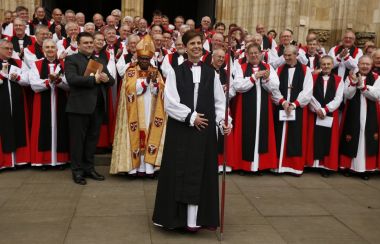Women in ministry: can we have evangelical unity?

Evangelicals don't stop being evangelicals if they believe in women leaders, according to the framers of a new statement on unity.
The 'Affirmation of Evangelical Unity over the Theology of Women and Men' is the brainchild of two Anglican ministers, Revs Fiona Gibson and Pete Myers, who aimed to identify common ground for 'complementarians' – who believe that women and men have different roles and that women should not preach to or lead men – and 'egalitarians', who believe that they may equally be called to any Church role.
It says: "As individuals we have diverse understandings of what it means for women and men to be equal while also different. But as fellow evangelicals we have a common bond and desire for mission to flourish as we remain united around the essentials and keep the main thing the main thing."
Myers and Gibson are encouraging Christian to sign the affirmation, which also includes repentance for past judgmental attitudes and a commitment to recognise the integrity of theological opponents.
The complementarian position is particularly strong among US conservative and fundamentalist evangelicals. While it claims that men and women 'complement' each other, it is associated with particular views of male headship, leading critics to describe it as a misnomer as it reflects a hierarchical understanding of gender relations.
The contrary egalitarian position is attacked by complementarians on the basis of biblical texts such as 1 Timothy 2:11-12, "A woman should learn in quietness and full submission. I do not permit a woman to teach or to assume authority over a man; she must be quiet." They also fear that egalitarians deny the significance of gender, opening the way to 'liberal' or 'progressive' (depending on your perspective) attitudes to human sexuality.
The Affirmation of Evangelical Unity seeks to encourage both sides to see the other as properly evangelical. Among other statements, it speaks of the equality before God of men and women, saying that "Women and men are equal in their humanity, their value as creatures made in the image of God and their fallen sinfulness." However, it also says that "Men and women are not so the same that they are interchangeable in Christian marriage".
It says that differences over the roles of men and women in ministry are "not a matter of primary doctrinal importance and not essential to eternal salvation".
The affirmation also commits signatories on both sides of the debate to repentance for previous judgmental positions. It also says that they will "bear with one another in love by empathising and fellowshipping regularly with those who disagree with us on the theology of men and women" and "work to provide provision for the consciences of those who disagree with us as far as our own conscience will allow".
Myers told Christian Today that he and Gibson began discussing the issue after the General Synod vote on women bishops in 2012. "It became clear to me that one of the major things at stake was that people on either side were worried that those on the other side were not really evangelical," he said.
The aim of the affirmation, he said, was "to affirm that the other side could take a different view of the issue but was still evangelical".
Himself a "classic complementarian", he said that he had talked to egalitarians who took a different view, holding that "precisely because men and women were complementary, the Church needs men and women at every level. That was really compelling. It didn't change my mind, but I thought, how can I not affirm this person's evangelicalism?"
While the affirmation has been gathering signatories, the complementarian position represents a small minority in UK evangelicalism. An Evangelical Alliance survey on attitudes toward women in leadership in 2012 found that more than 70 per cent of evangelicals believed either strongly or "a little" that women "should be eligible for all roles within the Church in the same way that men are", while only 10 per cent disagreed strongly.











